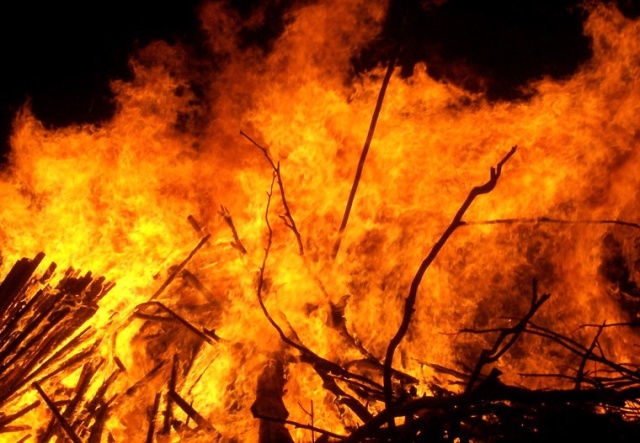
Church historians and hagiographic scholars have claimed that St. Patrick, then a bishop ordained by the pontiff, was the center of a dramatic confrontation on the occasion of the Christian Easter in 433 AD.
The date was May 1, and the site was the Hill of Slaine, ten miles distant from the High King’s domain at Tara.
At that time Patrick had been in Ireland only about a year, but he had been held as a slave for six or seven years when he was much younger. His master Milchu had been a high druid, and historians believe that Patrick must have learned much about the druids and the religious life of the people of Ireland, along with a thorough knowledge of the language and culture.
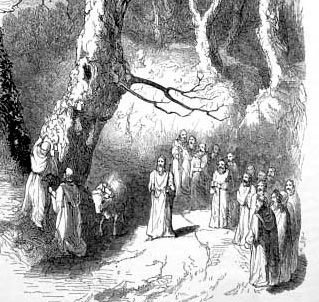
The Festival of Beltane, in honor of the sun god Bel, was one of the two most sacred observances in the Celtic world. Huge fires were lit all over the island, signifying (among other beliefs) purification and rebirth through the power of great Bel. One powerful high king when Patrick was in Éire was Leary, a stubborn and devoted pagan, who surrounded himself with scores of druids.
Leary’s purification fires, of course, were to be the highest and most sacred in the country, and Patrick well knew it. According to these historians, Patrick probably spent several months planning a fire that would not only rival Leary’s, but would awe and convert thousands on the occasion of the Christian Easter, which coincided with Beltane.
Patrick was not only stubborn and highly intelligent, he must have been a very courageous soul to flout the power of the highest power in the land.
In my novel WAKENING FIRE, I imagined what happened on that fateful day, May 1, 433 AD; and told it through the eyes of the main female character Caylith. After Patrick set his huge bonfire, King Leary angrily sent for the upstart to be brought before him on the sacred Hill of Tara.
[Incensed that the meddling priest has lit a high Easter bonfire in defiance of his Beltane ritual fire, High King Leary speaks to the bishop Patrick: ]
“Me druids tell me ye’d usurp the laws of our land. Ye’d defy the ancient Brehon precepts, an’ ye’d replace our gods with yours. How do ye plead on those counts?”
“I plead only to my God,” Patrick said evenly. “I speak to kings, and to common men alike. But I plead only to Christ, that he forgive your ignorance and hold you to his bosom in his mysterious love and compassion.”
I felt warm admiration for Patrick. In all the time I had known him, I had rarely seen even a trace of anger. But now I saw it slowly building in his eyes, and in his very demeanor, in spite of his mild words.
“Then I must bid me guards take ye to confinement.”
“Even as Herod did, would you so dismiss me?”
I saw Leary’s face change then, and a flicker of fear or alarm in his eyes. “If I but believed the lies ye spread about a man who died an’ walked again, then yes. Even as Herod.”
Patrick’s tone changed then, and for the first time he spoke softly, in the fatherly tone so familiar to me. “Thousands of your subjects believe those lies, O King. Would you call them foolish? Misguided? Or do they see something that perhaps you are missing? That Christ is love. Is é grá Chríost. That he asked not for special treatment. That he sought only to teach others about God’s love and forgiveness. That he did indeed die and live again, even as your own god Bel, whom you celebrate as the sun. And so I also celebrate Christ, also the son—the son of God.”
Leary’s voice was almost pleading now. “Then why do ye flout me laws, priest? Why do ye set your own fires to be higher than me own? How does that show love?”
“I must love all men, even as my Lord Christ loved. I cannot show you more love than I show your worthy fair-faced advisor.” And he gazed directly at one of the most ugly men I had ever beheld, a hairy-faced druid whose lower lip seemed to emit a constant stream of dribble. A ripple of laughter drifted through the room.
The druid stepped in front of Patrick then, and he stood on one foot and extended his bony arm, and with the other hand he held one eye shut. “Dóite agus loisceadh ort!”
“Burning and scorching on ye,” whispered Liam. I heard the note of awe in his voice. The druid’s high-pitched voice screeched almost as effectively as Talon’s own squawk had echoed in this room several months ago. Even I was mildly impressed.
Then Father Patrick drew himself up to the extent of his slight frame, and his own eyes began to crackle and burn. His tonsured head shone like a ritual fire in the bright light, and his voice rang out as though he were shouting at his enemy from a high rampart.
When Patrick utters his own curse in answer to the druid, everything changes. What words does he speak that spare him and change the mind of stubborn King Leary?
Guess you’ll just have to read Wakening Fire and the others in this trilogy, “The Dawn of Ireland.”
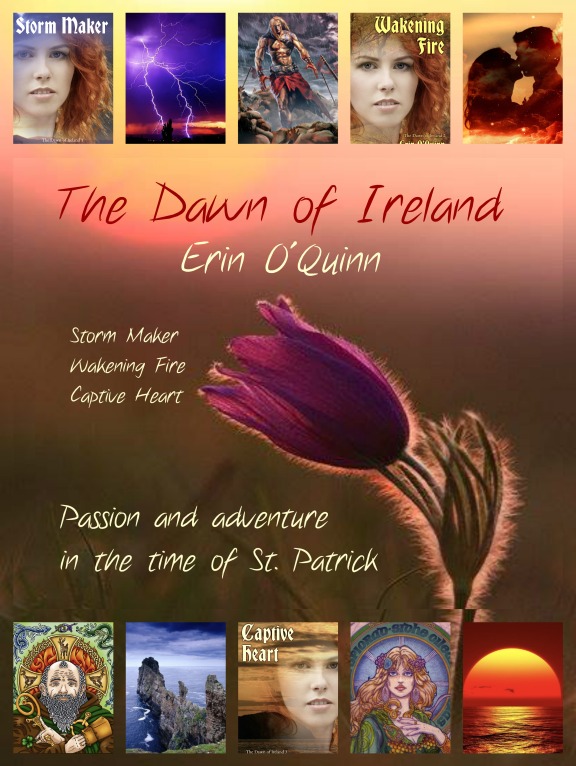


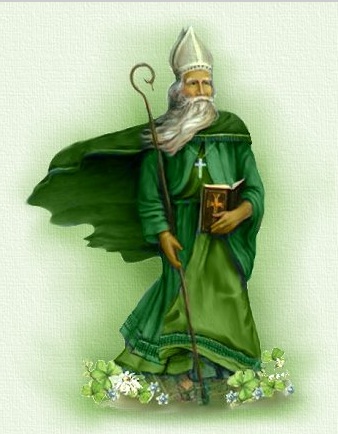
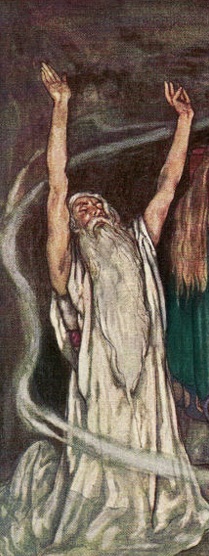
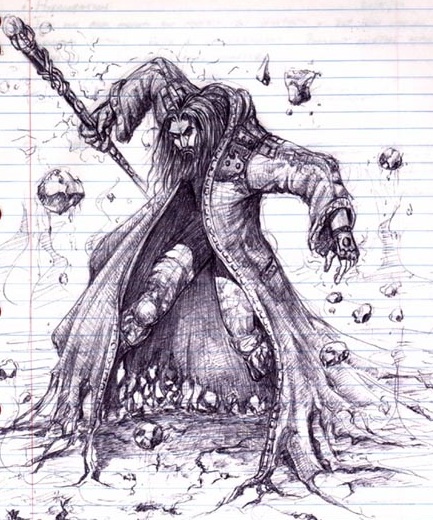
Fascinating to learn about this period in history (about which I am woefully ignorant) and even more wonderful to see it incorporated into your book.
LikeLike
You and everyone else except dusty, crusty old archaeologists and DNA specialists are ignorant about this time in history because…guess what… it was all pre-history until a man named Patrick arrived. He brought learning, the scriptures, the insistence on schools and scroll copying, and a multitude of other things that I adore him for. I’m not a religious person. But I have a crush on Pádraig. 😀
I appreciate the fact that you see how all this can be fodder for imaginary literature. In the absence of real history (outside of church dogma), I say make up your own! Thanks for dropping by, Diane. Happy Easter to you and yours.
LikeLike
lol I may be an archaeologist, but i don’t think I’m that crusty!!
LikeLike
Such a fascinating post, Erin – wonderful research and literary imagination!
LikeLike
Thank you so much, dear Romy. Can you tell that St. Paddy is my hero?
Much success to you, fondly, Erin
LikeLike
I love the research you have put into this, the history is amazing. Thank you. You are a beautiful writer!
LikeLike
Thank you, my friend. I never tire of reading about the exploits of the man called Patrick, even if I have to make ’em up myself. 😀
LikeLike
Love this! A great bit of history and a wonderful excerpt! Guess I have to read The Wakening Fire! Well done xx
LikeLike
Hoo boy! Thanks, Elaina! I love Father Patrick, and my MC Caylith does too…both of us in a fond, friendly way that makes sense when you read the novels. He was her first real mentor, one who saw into her rebellious spirit and her wellspring of kindness. Thank you for coming by on this holiday. Happy Easter! ~Erin
LikeLike
A perfect mix of history and wonder all in the same place! No wonder these books took off running when they began – there’s so much to learn and show along the way! I love it!
LikeLike
Oh, M. Peters, so happy you like it! This is the second of The Dawn of Ireland trilogy, where St. Patrick’s ritual fires were not the only flames blazing in Old World Ireland. I hope you’ll have a chance to read the Caylith odyssey some day from the beginning.
Thanks very much for visiting and commenting. It warms my heart.
LikeLike
Great research, this sounds awesome 🙂
LikeLike